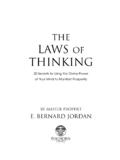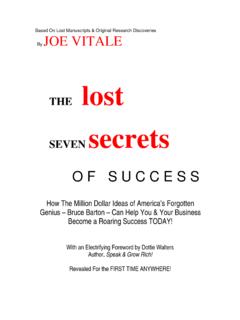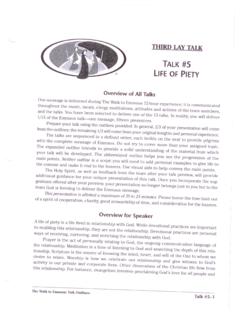Transcription of Sample questions to drive inquiry © Kath Murdoch 2014
1 From Murdoch ,k. Teaching in the spirit of inquiry in press 2015 1 Sample questions to drive inquiry Kath Murdoch 2014 People are more likely to take a deep approach to their learning when they are trying to answer questions or solve problems that they have come to regard as important, intriguing or just beautiful. One of the great secrets to fostering deep learning is the ability to help students raise new kinds of questions that they will find fascinating. (Bain, 2012:4) It is increasingly common practice to drive a journey of inquiry through a big question . Variously described as essential questions , rich questions , fertile questions , compelling questions , this use of a question to signal a focus for learning helps position the experience as an inquiry based one. Exploring the question What does it mean to make a wise choice? feels quite different to announcing that we will be doing a unit on decision making.
2 I will use the term compelling question here because it reminds us that the question we devise should, as much as possible, compel the learner to want to find out more. It should be something that is worth investigating. Compelling questions can be devised by teachers or in conjunction with students. They may focus on skills or on content but should allow for transferability. Compelling questions will often travel the arc of an inquiry and are returned to over and over again each time with a deeper and more informed response. A Sample of inquiry questions questions to prompt more project/design oriented inquiry Typically, a project-based inquiry is driven by some kind of task/action/product that is worked toward over several weeks. The inquiry process is essentially that which helps learners find out more about what they need to DO and KNOW ABOUT in order to achieve this practical goal. Some examples: Students examine the question How can we create a sustainable garden in our school?
3 As they work towards the project of making some kind of garden. Young children ask what makes a great playground? as they work on the project of designing models to take to the school board to share their hopes for the new playground What does it take to make an effective theatre prop? Students take on the responsibility of designing, making and evaluating the props for a school production. What makes a great short film? Students work in teams to investigate, write, film, produce and edit their own short films for a class or school film festival. How can we use water/energy in more sustainable ways? What kind of website would best represent our school/class? How can we make a chicken coup that will keep our chickens safe and healthy? How can we turn our classroom into a museum? How can we create an end of year performance that will show-case our achievements? How can we attract more native birds/animals to our garden?
4 What kind of canteen menu should we have at our school? How can we communicate our learning at school to others in the wider community? How can we encourage the school and wider community? What kind of uniform do we want for our school? What do we need to do to make a successful puppet theatre? How can I create an artwork to promote wellbeing? How can we redesign assemblies to involve the parent community more? From Murdoch ,k. Teaching in the spirit of inquiry in press 2015 2 How can we plan a successful camping trip? Can we create an enclosure to keep (insert animal!) healthy and happy? Can we create and sell something at a profit so we can contribute to our favourite charity? Can we make a short film that promotes wellbeing? Can we redesign the playground for greater fitness and fun? How can we build an energy efficient vehicle? Philosophical/ethical inquiry Philosophical inquiry encourages students to explore questions that go to the heart of what it means to be human.
5 This kind of inquiry can often work within and beside other inquiries or simply be the focus of an inquiry in its own right. Characterised by an emphasis on dialogue philosophical inquiry encourages students to explore their values and beliefs as well as exercising their creativity and metacognition. This kind of inquiry can be structured as an ongoing, major unit or may be the focus for one or two lessons. Some examples: Many questions lend themselves to philosophical inquiry . These questions are typically those with many answers and those that may never really BE fully What makes me who I am? Does the past make us who we are? What is art? What is imagination? Do we need heroes? Is it ever OK to steal? What matters more the fly or the elephant? How well do your family know you? Who knows you best? Can we be happy and sad at the same time? Is dreaming thinking? How do we know what is real? How do we know if something is true?
6 What is a miracle? Do they happen? Is it better to give or receive? What s worth saving? Do we need school? What is a good education? Issues based inquiry In issues-based inquiries, the emphasis is on the location and exploration of a problem in order to , hopefully, reach some kind of recommendation for actions and solutions. Unlike project based inquiries, problem based inquiries do not have a specific end in mind rather they seek to come to some kind of solution through the investigation of the issues around a problem. Problems for inquiry can be large or small. They may have global or local significance. They offer a powerful and authentic purpose for investigation as, by their nature, the inquiry is happening because of a NEED to sort something out or alleviate a Sharing experiences and ideas in this way and ideas is a highly motivating form of collaborative inquiry . From Murdoch ,k. Teaching in the spirit of inquiry in press 2015 3 Some examples: How can we make our school a safer place?
7 How can we reduce our energy use in the school? What can we do about the waste? How can we attract more native birds to our yard? Can we help clean up the local waterway? How can we reduce our energy use in the school? Can we re-design our classroom space so it is better for learning? What can be done about traffic at pick up time? How can we deal with bullying in our school? What kind of canteen should we have? What food should be sold? How can we deal with the waste in our school? What can we do to support refugees/homeless/ disadvantaged people in Australia? How can we make a difference to children in developing countries? What can we do about Australian endangered animals? How can we help our local community meet the needs of young people? Contexts for inquiry within the broad disciplines While the table below identifies inquiry contexts within the broad disciplines they are by no means mutually exclusive in fact MANY of these questions can be developed as highly interdisciplinary investigations.
8 In the primary school in particular, much of the inquiry work we do is integrative in nature. Some examples: Humanities How and why do people seek homes in new places? What is work and why do people do it? How does popular culture affect us? How does popular culture change over time? Where is the past in the present? Poverty: whose responsibility? How does where we live affect HOW we live? How do children live in other places? What makes a great leader? Who has power? Does the past make us who we are? Can we belong to more than one culture? What makes a good home? How can we improve our school/community? Sciences What makes it move? What makes the earth work? and how can we care for it? What lies beneath us and why does it matter? Where is the science in cooking? What makes a great construction? What s it made of and why? How do we know it is true? What s out there and how do we know?
9 How do living things change as they grow? How do living things survive in changing environments? How does climate affect ecosystems? How does science influence sport? How could we design the most efficient bicycle? How do humans and other Health and well being How can I care for my body? What makes my body work? What makes a good friend? Why do humans play games? What makes a great game? How do humans change over time? What makes us happy? What does it mean to be fit? How safe are we? How safe is our school/community? How can we make a difference to the lives of others? What is a healthy/unhealthy relationship? What makes a good pet and why do people have them? Why do people eat what they eat? How do our choices affect our health? Is practice enough for success? What does being successful From Murdoch ,k. Teaching in the spirit of inquiry in press 2015 4 Are we more the same or more different than others?
10 How and why do people explore? What makes a great community? Why do people belong to groups? Why is history worth knowing? What legacy will we leave behind? Whose history is it? What makes this place unique? How are places different? How and why do we move from place to place? How do places change over time? What can a map tell us? How do we govern ourselves? Do we need rules? How do we know if we weren t there? What stands the test of time? How and why do we remember/commemorate events of the past? Can society work without a government? How can I have my say? Who should rule and why? Why do we have money? What does it really cost? Does technology change our lives for the better? What happens when cultures collide? Who was here first? How do we know? What makes a fair trade? Were they the good old days? What makes the news and why? animals relate? How do animals communicate?





